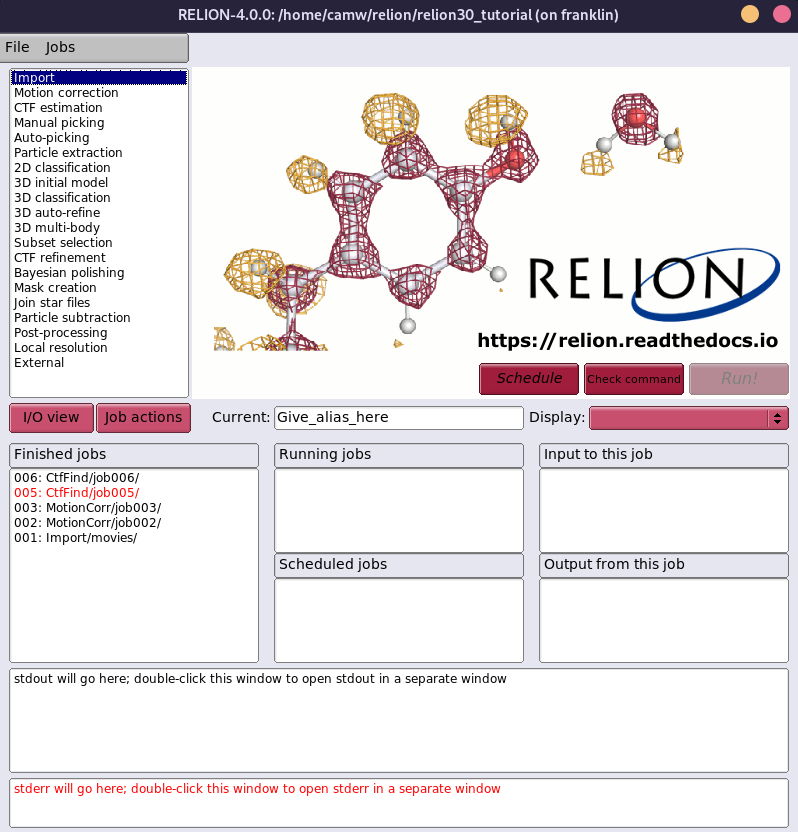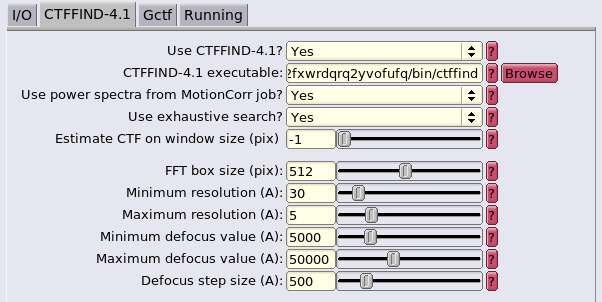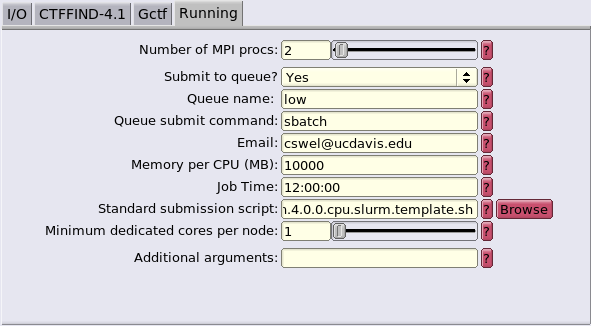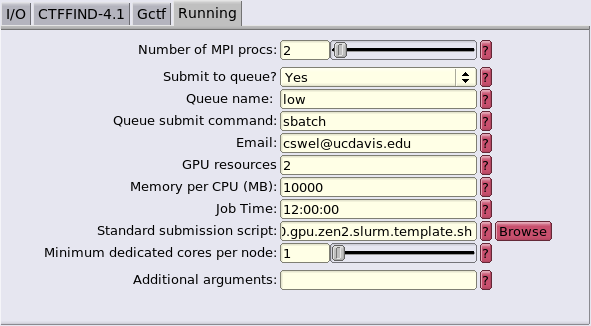Cryo-EM Software Stack¶
Relion¶
Franklin has multiple CPU and GPU optimized versions of the Relion cryo-EM structural determination package.
The head node has been configured to support X11 forwarding, enabling the Relion GUI to be launched.
Relion jobs are submitted for batch processing on the cluster node via Slurm.
Each Relion module exports the necessary configurations to pre-fill job submission and dependency information in the GUI, and we have defined additional GUI fields to further configure Slurm parameters.
We are also maintaining an additional software package, relion-helper, to assist users in switching between Relion modules within the same project.
Your first step is deciding which Relion variant you should use.
We recommend version 4.0.0, as it is the currently-supported stable release.
There are three variants of this version: relion/cpu/4.0.0+amd, relion/gpu/4.0.0+amd, and relion/gpu/4.0.0+intel, which correspond to the CPU optimized, GPU with AMD CPU optimized, and GPU with Intel CPU optimized builds, respectively.
More information about these modules is available in the Module Variants section.
In general, unless you have access to the three GPU nodes owned by the Al-Bassam lab, you can ignore the Intel variants, and use the CPU +amd version for multi-node CPU only jobs and the GPU +amd version if you have access to a GPU node.
If you are completely unfamiliar with Relion, you should start with the tutorial.
Note
Because Relion is GUI driven, you need to ssh to Franklin with X11 forwarding enabled.
Instructions for enabling X11 forwarding can be found in the Access section.
Launching Relion¶
Make sure you have loaded one of the Relion modules:
$ module list relion
Currently Loaded Modules Matching: relion
1) relion/gpu/4.0.0+amd 2) relion-helper/0.2
Change your working directory your Relion project directory and type relion.
The Relion GUI should then pop up locally.
There will be a bit of latency when using it, especially if you are off campus.
You may be able to reduce latency by enabling SSH compression.

Dependency Configuration¶
The paths to software that different Relion jobs use will be automatically filled in. Editing these paths, unless you really, really know what you are doing, is not recommended and will likely result in problems, as some of these dependencies are compiled with architecture-specific flags that match their Relion variant.

Danger
If you plan to switch between Relion modules within the same project, you must use the procedure described in the relion-helper section. Failure to do so will result in execution errors.
Slurm Configuration¶
Our Relion deployment has additional fields in the Running tabs. These new fields are:
- Email: The email to which Slurm will send job status updates. Fills the
--mail-usersbatch/srunparameter. - Memory per CPU: Fills the Slurm
--memory-per-cpuparameter. Total RAM use of a job will be (Number of MPI procs) * (Number of Threads) * (Memory per CPU), when the Number of Threads field is available; otherwise it will be (Number of MPI procs) * (Memory per CPU). - Job Time: Fills Slurm's
--timeparameter. - GPU Resources: Only available in the GPU modules. Number (and optionally type) of GPUs to request for this job. If only an integer is supplied, will request any GPU. If
TYPE:NUMis supplied (example:a4000:4), specific models of GPU will be requested. See the Resources section for more information on available GPU types.

relion/cpu modules lack the GPU resources field. Note the submission script as well.

relion/gpu module has an extra field for GPU resources. Also note the differing submission script.
The default GUI fields serve their original purposes:
- Number of MPI procs: This will fill the Slurm
--ntasksparameter. These tasks may be distributed across multiple nodes, depending on the number of Threads requested. For GPU runs, this should be the number of GPUs + 1. - Number of Threads: The will fill the Slurm
--cpus-per-taskparameter, which means it is the number of threads per MPI proc. Some job types do not expose this field, as they can only be run with a single-thread per MPI proc. - Queue name: The Slurm partition to submit to, filling the
--partitionparameter. More information on partitions can be found in the Queueing section. - Standard submission script: The location of the Slurm job script template that will be used. This field will be filled with the appropriate template for the loaded Relion module by default, and should not be changed.For advanced users only: if you are familiar with Relion and want to further fine-tune your Slurm scripts, you can write your own based on the provided templates found in
/share/apps/spack/templates/hpccf/franklinor in our spack GitHub repo. - Minimum dedicated cores per node: Unused on our system.
Switching Between Relion Modules: relion-helper¶
Sometimes, you may wish to use different Relion modules for different tasks while working within the same project --
perhaps you'd prefer to use the CPU-optimized version for CTF estimation and the GPU-optimized version for 3D refinement.
This does not work out of the box.
Relion fills the filesystem paths of its dependencies and templates from environment variables, and those environment
variables are set in the modulefiles of the differing Relion builds.
However, when a Relion job is run, those paths are cached in hidden .star files in the project directory, and
the next time Relion is run, it fills those paths from the cache files instead of the environment variables.
This means that, after switching modules, the cached location of the previous module will be used, instead of the
exported environment variables from the new module.
This causes major breakage due to dependencies having different compilation options to match the parent Relion
they are attached to and Slurm templates having different configuration options available.
Luckily, we have a solution! We wrote and are maintaining relion-helper, a simple utility that updates the cached variables in a project to match whatever Relion module is currently loaded. Let's go over example use of the tool.
In this example, assume we have a relion project directory at /path/to/my/project.
We ran some steps with the module relion/gpu/4.0.0+amd, and now want to switch to relion/cpu/4.0.0+amd.
First, let's swap modules:
$ module unload relion/gpu/4.0.0+amd
amdfftw/3.2+amd: unloaded.
ctffind/4.1.14+amd: unloaded.
relion/gpu/4.0.0+amd: unloaded.
motioncor2/1.5.0: unloaded.
gctf/1.06: unloaded.
ghostscript/9.56.1: unloaded.
$ module load relion/cpu/4.0.0+amd.lua
amdfftw/3.2+amd: loaded.
ctffind/4.1.14+amd: loaded.
relion/cpu/4.0.0+amd: loaded.
motioncor2/1.5.0: loaded.
gctf/1.06: loaded.
ghostscript/9.56.1: loaded.
And load relion-helper:
$ module load relion-helper
relion-helper/0.2: loaded.
$ relion-helper -h
usage: relion-helper [-h] {reset-cache} ...
positional arguments:
{reset-cache}
options:
-h, --help show this help message and exit
Now, change to the project directory:
Then, run the utility. It will pull the updated values from the appropriate environment variables that were exported by the new module and write them to the cache files in-place.
$ relion-helper reset-cache
> .gui_ctffindjob.star:41:
qsub_extra2: 2 => 10000
> .gui_ctffindjob.star:42:
qsub_extra3: 10000 => 12:00:00
> .gui_ctffindjob.star:43:
qsubscript: /share/apps/spack/templates/hpccf/franklin/relion.4.0.0.gpu.zen2.slurm.template.sh =>
/share/apps/spack/templates/hpccf/franklin/relion.4.0.0.cpu.slurm.template.sh
> .gui_class2djob.star:53:
qsub_extra2: 2 => 10000
> .gui_class2djob.star:54:
qsub_extra3: 10000 => 12:00:00
> .gui_class2djob.star:55:
qsubscript: /share/apps/spack/templates/hpccf/franklin/relion.4.0.0.gpu.zen2.slurm.template.sh =>
/share/apps/spack/templates/hpccf/franklin/relion.4.0.0.cpu.slurm.template.sh
> .gui_autopickjob.star:63:
qsub_extra2: 2 => 10000
> .gui_autopickjob.star:64:
qsub_extra3: 10000 => 12:00:00
> .gui_autopickjob.star:65:
qsubscript: /share/apps/spack/templates/hpccf/franklin/relion.4.0.0.gpu.zen2.slurm.template.sh =>
/share/apps/spack/templates/hpccf/franklin/relion.4.0.0.cpu.slurm.template.sh
> .gui_importjob.star:38:
qsub_extra2: 2 => 10000
...
The above output is truncated for brevity. For each cached variable it updates, it reports the name of the cache file, the line number of the change, and the variable name and value of the change. You can now launch Relion and continue with your work.
Each time you want to switch Relion modules for a project, you will need to run this after loading the new module.
For now, relion-helper only has the reset-cache subcommand.
You can skip cding to the project directory by passing the project directory to it instead:
Although the changes are made in-place, it leaves backups of the modified files, in case you are concerned about bugs.
The original files are of the form .gui_[JOBNAME].star, and the backups are suffixed with .bak:
$ ls -al /path/to/my/project
total 317
drwxrwxr-x 10 camw camw 31 Feb 3 10:02 .
drwxrwxr-x 4 camw camw 6 Jan 12 12:58 ..
drwxrwxr-x 5 camw camw 5 Jan 12 12:46 .Nodes
drwxrwxr-x 2 camw camw 2 Jan 12 12:40 .TMP_runfiles
-rw-rw-r-- 1 camw camw 1959 Feb 3 10:02 .gui_autopickjob.star
-rw-rw-r-- 1 camw camw 1957 Feb 3 10:01 .gui_autopickjob.star.bak
-rw-rw-r-- 1 camw camw 1427 Feb 3 10:02 .gui_class2djob.star
-rw-rw-r-- 1 camw camw 1425 Feb 3 10:01 .gui_class2djob.star.bak
-rw-rw-r-- 1 camw camw 1430 Feb 3 10:02 .gui_ctffindjob.star
-rw-rw-r-- 1 camw camw 1428 Feb 3 10:01 .gui_ctffindjob.star.bak
...
Warning
We do not recommend changing between major Relion versions within the same project: ie, from 3.0.1 to 4.0.0.
Module Variants¶
There are currently six variations of Relion available on Franklin. Versions 3.1.3 and 4.0.0 are available, each with:
- A CPU-optimized build compiled for AMD processors:
relion/cpu/[VERSION]+amd - A GPU-optimized build compiled for AMD processors:
relion/gpu/[VERSION]+amd - A GPU-optimized build compiled for Intel processors:
relion/gpu/[VERSION]+intel
The CPU-optimized builds were configured with -DALTCPU=True and without CUDA support.
For Relion CPU jobs, they will be much faster than the GPU variants.
The AMD-optimized +amd variants were compiled with -DAMDFFTW=ON and linked against the amdfftw implementation of FFTW, in addition to having Zen 2 microarchitecture flags specified to GCC.
The +intel variants were compiled with AVX2 support and configured with the -DMKLFFT=True flag, so they use the Intel OneAPI MKL implementation of FFTW.
All the GPU variants are targeted to a CUDA compute version of 7.5.
The full Cryo-EM software stack is defined in the HPCCF spack configuration repository, and we maintain our own Relion spack package definition.
More information on the configurations described here can be found in the Relion docs.
The different modules may need to be used with different Slurm resource directives, depending on their variants. The necessary directives, given a module and job partition, are as follows:
| Module Name | Slurm Partition | Slurm Directives |
|---|---|---|
relion/cpu/[3.1.3,4.0.0]+amd |
low |
--constraint=amd |
relion/cpu/[3.1.3,4.0.0]+amd |
high |
N/A |
relion/gpu/[3.1.3,4.0.0]+amd |
low |
--constraint=amd --gres=gpu:[$N_GPUs] or --gres=gpu:[a4000,a5000]:[$N_GPUs] |
relion/gpu/[3.1.3,4.0.0]+amd |
jalettsgrp-gpu |
--gres=gpu:[$N_GPUs] |
relion/gpu/[3.1.3,4.0.0]+amd |
mmgdept-gpu |
--gres=gpu:[$N_GPUs] |
relion/gpu/[3.1.3,4.0.0]+intel |
low |
--constraint=intel --gres=gpu:[$N_GPUs] or --gres=gpu:[rtx_2080_ti]:[$N_GPUs] |
relion/gpu/[3.1.3,4.0.0]+intel |
jawdatgrp-gpu |
--gres=gpu:[$N_GPUs] |
For example, to use the CPU-optimized Relion module relion/cpu/4.0.0+amd on the free, preemptable low partition, you should submit jobs with --constraint=amd so as to eliminate the Intel nodes in that partition from consideration.
However, if you have access to and are using the high partition with the same module, no additional Slurm directives are required, as the high partition only has CPU compute nodes.
Alternatively, if you were using an AMD-optimized GPU version, like relion/gpu/4.0.0+amd, and wished to use 2 GPUs on the low partition, you would need to provide both the --constraint=amd and a --gres=gpu:2 directive, in order to get an AMD node on the partition along with the required GPUs.
Those with access to and submitting to the mmgdept-gpu queue would need only to specify --gres=gpu:2, as that partition only has AMD nodes in it.
Note
If you are submitting jobs via the GUI, these Slurm directives will already be taken care of for you.
If you wish to submit jobs manually, you can get the path to Slurm submission template for the currently-loaded module from the $RELION_QSUB_TEMPLATE
environment variable; copying this template is a good starting place for building your batch scripts.
ctffind¶
Our installation of CTFFIND4 has +amd and +intel variants
which, like Relion, are linked against amdfftw and Intel OneAPI MKL, respectively.
The Slurm --constraint flags should be used with these as well, when appropriate, as indicated in the Relion directive table.
Each Relion module has its companion CTFFIND4 module as a dependency, so the appropriate version will automatically be
loaded when you load Relion, and the proper environment variables are set for the Relion GUI to point at them.
MotionCor2¶
We have deployed MotionCor2 binaries which have been patched to link against the appropriate version of CUDA. These are targetted at a generic architecture, as the source code is not available. Like CTFFIND4, this module is brought in by Relion and the proper environment variables set for Relion to use it.
Gctf¶
Gctf binaries have been patched and deployed in the same manner as MotionCor2.